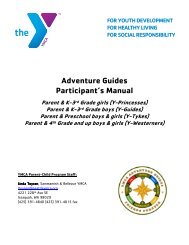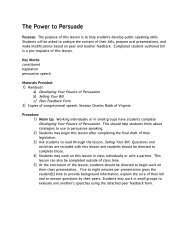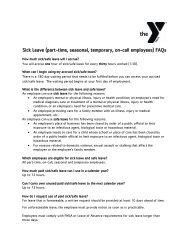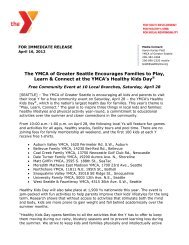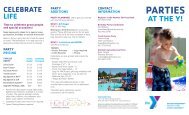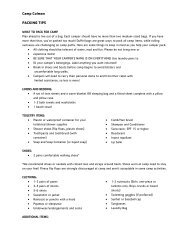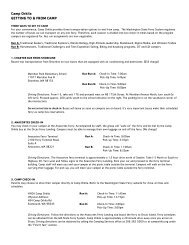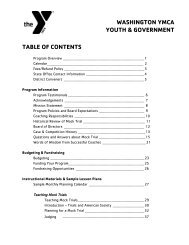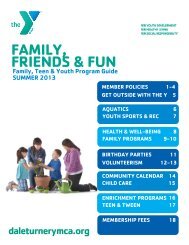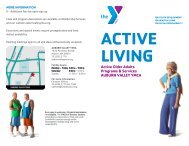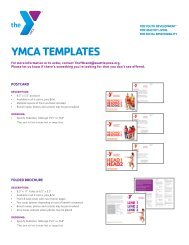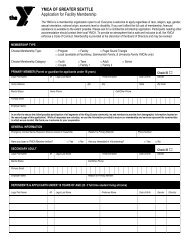washington mock trial rules of evidence - YMCA of Greater Seattle
washington mock trial rules of evidence - YMCA of Greater Seattle
washington mock trial rules of evidence - YMCA of Greater Seattle
You also want an ePaper? Increase the reach of your titles
YUMPU automatically turns print PDFs into web optimized ePapers that Google loves.
Comment: The hackneyed example <strong>of</strong> the question that assumes facts not in <strong>evidence</strong> is,“Are you still beating your wife?” The question is improper because the questioner has notestablished that the witness ever beat his wife.(F) Proper Foundation Required. Attorneys shall lay a proper foundation for testimony andprior to <strong>of</strong>fering exhibits into <strong>evidence</strong>. After the exhibit has been <strong>of</strong>fered into <strong>evidence</strong>,the exhibit may still be objected to on other grounds.Comment: The “foundation” requirement for <strong>evidence</strong> provides the jury the basis for the<strong>evidence</strong> being <strong>of</strong>fered. Evidence that is premature or not adequately supported by priortestimony is said to “lack foundation.”In <strong>mock</strong> <strong>trial</strong>, the parties usually stipulate to the authenticity <strong>of</strong> exhibits before <strong>trial</strong>, andthe court’s ruling on the pre<strong>trial</strong> motion determines the admissibility <strong>of</strong> contested exhibits.Nevertheless, the attorney should establish that the witness has previously seen the itemand can identify it before <strong>of</strong>fering it into <strong>evidence</strong>. (See Introduction <strong>of</strong> Exhibits below.)When an attorney objects for lack <strong>of</strong> foundation, he or she is using legal “shorthand” tocomplain to the judge that the question asks for testimony which is premature, i.e., whichis not admissible yet because some other fact or facts must be elicited before this questioncan be asked. For example, before a witness can be asked to identify the defendant as theperpetrator <strong>of</strong> a crime, the witness must first testify that he was at the scene <strong>of</strong> the crimeor has some other first-hand basis for identifying the defendant as the perpetrator.Similarly, before a witness to an intersection accident can testify to the collision itself, theattorney should ask questions establishing her presence at the scene and her opportunityto observe events as they occurred.Before an expert witness can render pr<strong>of</strong>essional opinions, he must first testify as to hisqualifications and be accepted by the court as an expert in the field or specialty area inquestion. Thus, before a ballistics expert can <strong>of</strong>fer an opinion as to whether a particulargun fired a particular bullet, the attorney should ask questions establishing the witness’sexpertise, training, examination <strong>of</strong> the items, etc.In either case, an opposing attorney would simply object to the lack <strong>of</strong> foundation as a way<strong>of</strong> saying the <strong>evidence</strong> might be admissible later but it surely is not admissible now. Thisobjection may be overcome by asking more questions and eliciting more information aboutthe bases for the witness’s testimony.(G) Non-responsive Answers Objectionable. A witness's answer is objectionable if it failsto respond to the question asked.



